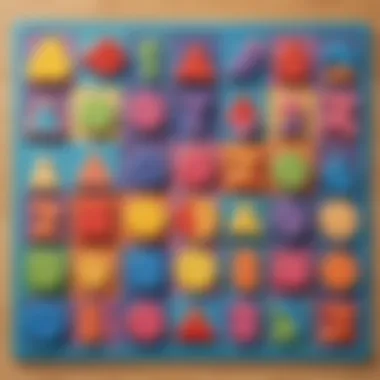Engage Your Preschooler with Exciting Pre-K Number Activities


Fun Activities Ideas
Engaging young pre K learners in fun and interactive activities is vital for developing their numeracy skills. Whether indoors or outdoors, there are various avenues to make learning numbers entertaining and educational.
Indoor Activities
Indoor activities provide a controlled environment where children can focus on numbers without distraction. Initiating number recognition through activities like number scavenger hunt or creating a hopscotch with numbers can make learning engaging. Utilizing number flashcards or number blocks in indoor games like 'Number Bingo' can reinforce numerical concepts effectively.
Outdoor Adventures
Taking learning outside can inject a sense of adventure into numeric education. Utilize nature to teach numbers - counting rocks, leaves, or sticks. Sidewalk chalk can be used to draw numbers and practice number tracing. Engaging in outdoor treasure hunts where children have to find objects in numerical order can be an exciting way to reinforce numeracy skills.
Arts and Crafts
Arts and crafts activities offer a hands-on approach to learning numbers creatively. Creating number-themed artworks, such as number collages or number-shaped clay sculptures, can engage children in a sensory and visual learning experience. Crafting number-themed jewelry or decorating number-based puzzles can merge art with numeracy seamlessly.
Science Experiments
Incorporating science experiments into number learning can stimulate curiosity and critical thinking. Activities like measuring ingredients for simple recipes or conducting basic physics experiments involving counting can bridge the gap between numbers and real-world applications.
Cooking and Baking
Cooking and baking provide practical opportunities to apply numeracy skills. Involving children in measuring ingredients, counting utensils, or following recipe instructions that involve numerical sequences can enhance numerical understanding in a tangible way.
Introduction
The foundation of numeracy skills in early childhood is crucial for a child's cognitive development and academic success. In this article, we delve into the world of pre-K number activities, designed to spark young learners' curiosity and understanding of mathematical concepts. By engaging children in meaningful and interactive experiences with numbers, parents, teachers, and caregivers can lay a strong mathematical groundwork that fosters lifelong learning.
Understanding the Significance of Early Number Skills Development


As young children embark on their educational journey, introducing them to numbers at an early age paves the way for future mathematical proficiency. Early number skills development goes beyond rote counting; it cultivates essential cognitive abilities such as problem-solving, critical thinking, and pattern recognition. By immersing children in numeracy activities from an early age, we not only enhance their mathematical competence but also stimulate overall brain development.
Moreover, early exposure to numbers instills confidence in children's mathematical abilities, shaping positive attitudes towards learning. Building a strong numeracy foundation in the formative years equips children with the skills necessary to tackle advanced mathematical concepts later in their academic pursuits. By emphasizing the significance of early number skills development, we prioritize holistic cognitive growth and academic preparedness in young learners.
Interactive Number Games
With the focus on enhancing numeracy skills for young learners, interactive number games play a pivotal role in this exploration of pre K number activities. Introducing children to numbers through engaging and interactive experiences lays a strong foundation for their mathematical development. These games are not only enjoyable but also strategically designed to promote cognitive growth and numerical fluency. By incorporating interactive number games into early education, children can grasp fundamental mathematical concepts in a playful and memorable manner, setting the stage for future academic success.
Counting with Fun: Incorporating Counting Games in Daily Activities
Number Hunt
Number Hunt serves as a dynamic approach to reinforce counting skills in preschoolers. This activity involves searching for specific numbers in their environment, encouraging children to actively engage in counting while exploring their surroundings. The allure of discovery makes Number Hunt an exciting and effective method to enhance numeracy skills. Its interactive nature instills a sense of accomplishment in young learners, boosting their confidence and number fluency.
Counting with Objects
Engaging children in Counting with Objects not only aids in numerical literacy but also enhances their tactile learning experience. By physically counting objects, children develop a deeper understanding of numbers and their quantities. This hands-on approach fosters a tangible connection between numbers and real-world items, fostering a more profound grasp of mathematical concepts.
Number Bingo
Number Bingo offers a social and engaging way to reinforce number recognition and sequencing skills. This game not only promotes numerical fluency but also cultivates critical thinking and concentration in children. Additionally, the element of competition in Number Bingo adds an exciting twist to the learning process, making it a popular choice among educators and parents seeking to make numeracy fun and educational.
Number Recognition Activities: Enhancing Visual Identification of Numbers
Number Matching Game
The Number Matching Game is a valuable tool for enhancing visual identification of numbers in early learners. By matching numerical symbols, children strengthen their ability to recognize numbers quickly and accurately. This activity not only sharpens cognitive skills but also boosts memory retention of numerical patterns and sequences. Its interactive format makes it a popular choice for educators looking to engage children in a fun and effective way.
Number Puzzles
Number Puzzles offer a stimulating challenge that promotes critical thinking and problem-solving skills. These puzzles require children to arrange numerical pieces in a logical order, honing their ability to sequence numbers correctly. Additionally, Number Puzzles enhance spatial awareness and logical reasoning, making them a multifaceted activity for developing numerical skills in young learners.


Number Flashcards
Integrating Number Flashcards into learning activities accelerates visual identification of numbers while enhancing memory retention. Flashcards provide a quick and accessible way for children to practice number recognition repeatedly, increasing their familiarity with numerical symbols. This repetition reinforces numeracy skills, making Number Flashcards a versatile and effective tool for strengthening visual identification of numbers in preschoolers.
Sequencing and Ordering Exercises: Developing Numerical Sequencing Skills
Number Train Activity
The Number Train Activity engages children in a hands-on approach to numerical sequencing, encouraging them to arrange numbers in a logical order. By physically moving numbered cards along a 'train track,' children develop a concrete understanding of numerical progression. This activity not only enhances numerical sequencing but also fosters fine motor skills and coordination in young learners. Its interactive and immersive nature makes the Number Train Activity a valuable tool for developing numeracy skills.
Number Sequencing Game
The Number Sequencing Game challenges children to arrange numbers in ascending or descending order, refining their numerical sequencing abilities. This game stimulates critical thinking and logical reasoning while reinforcing the concept of number progression. Through immersive gameplay and structured challenges, children develop a solid foundation in numerical sequencing, preparing them for more complex math concepts in the future.
Missing Number Challenges
Introducing children to Missing Number Challenges encourages them to identify and fill in numerical gaps, enhancing their ability to recognize number patterns. By strategically placing missing numbers within sequences, children sharpen their problem-solving skills and numerical fluency. This activity promotes attentiveness and analytical thinking, making it an engaging and effective method for honing numerical sequencing skills in young learners.
Hands-On Number Learning
In the realm of early childhood education, hands-on learning has proven to be an essential component for nurturing young learners' cognitive development. Amidst the countless pre K number activities available, hands-on approaches stand out for their tangible and engaging nature. This article accentuates the significance of incorporating hands-on number learning activities to cultivate a strong numerical foundation in preschoolers. By offering a multisensory learning experience, hands-on activities not only enhance numerical understanding but also foster critical thinking, problem-solving skills, and fine motor development. The interactive and tactile nature of hands-on learning aids in retaining information more effectively, making it a pivotal tool in the early stages of numerical literacy. Parents, teachers, and caregivers can leverage hands-on number learning to create a stimulating and dynamic educational environment that caters to the unique learning styles of young children.
Math Manipulatives: Utilizing Hands-On Materials for Concrete Learning
Counting Beads
Counting beads are a fundamental math manipulative that plays a vital role in hands-on number learning. These colorful beads not only assist children in grasping counting principles but also introduce them to basic mathematical operations such as addition and subtraction. The tactile sensation of moving beads along a string enhances kinesthetic learning and aids in developing fine motor skills. Counting beads are revered for their versatility, allowing children to engage in a wide array of numeracy activities, from simple counting exercises to more complex problem-solving tasks. While promoting numerical fluency, counting beads also nurture children's creativity and imagination through interactive play.
Number Blocks
Number blocks serve as foundational tools for concrete learning experiences in early numeracy education. These versatile blocks enable children to physically manipulate numbers, encouraging them to explore mathematical concepts through hands-on experimentation. The tactile feedback provided by number blocks fosters a deep understanding of number relationships and numerical patterns. Moreover, the visual representation of numbers through blocks helps solidify abstract mathematical ideas, laying a strong numerical groundwork for young learners. Number blocks are celebrated for their durability and adaptability in facilitating group activities, independent exploration, and collaborative learning environments.


Ten Frames
Ten frames are invaluable resources for developing children's conceptual understanding of numbers in a hands-on manner. Utilizing ten frames empowers young learners to visualize numbers as groupings of ten, reinforcing the foundations of place value and numerical composition. The structured layout of ten frames enhances children's ability to comprehend mathematical operations, such as addition and subtraction, by organizing quantities into manageable sets. By engaging with ten frames, children cultivate a strategic approach to problem-solving and develop a keen sense of number sense. Ten frames offer a concrete representation of abstract mathematical concepts, bridging the gap between physical manipulation and conceptualization, making them essential in promoting mathematical proficiency among preschoolers.
Educational Apps and Online Resources
In the digital age, Educational Apps and Online Resources play a pivotal role in shaping young learners' educational journey towards numeracy skills development. These resources offer a dynamic and interactive platform for children to engage with numbers in a fun and innovative way. By incorporating Educational Apps and Online Resources into early childhood education, parents, teachers, and caregivers can provide personalized learning experiences tailored to each child's pace and preferences. These tools not only supplement traditional learning methods but also adapt to the evolving technological landscape, ensuring that children are equipped with the necessary skills to navigate a digitally-driven world.
Digital Learning Tools: Exploring Interactive Apps for Numeracy Development
Number Recognition Apps
Number Recognition Apps serve as a cornerstone in fostering numeracy skills among young learners. These apps focus on enhancing children's ability to identify and distinguish numbers from an early age. With engaging visuals, interactive exercises, and auditory cues, Number Recognition Apps create an immersive learning environment that captivates children's interest and encourages active participation. One key characteristic of Number Recognition Apps is their user-friendly interface, which makes them accessible and engaging for young children. By offering a blend of entertainment and education, these apps simplify complex mathematical concepts into digestible content, facilitating a seamless learning experience for preschoolers. However, it is crucial for parents and educators to monitor screen time and ensure that children strike a balance between digital learning and other forms of play for holistic development.
Counting Games Online
Counting Games Online serve as a dynamic tool for reinforcing numeracy concepts in young learners. These interactive games not only enhance children's counting skills but also promote critical thinking, problem-solving, and hand-eye coordination. The key characteristic of Counting Games Online lies in their ability to gamify learning, making math concepts exciting and accessible for children. By incorporating storytelling, colorful visuals, and rewards systems, these games transform abstract numerical concepts into engaging challenges that encourage active participation and skill development. Counting Games Online offer a versatile learning experience that adapts to children's individual progress, providing personalized feedback and guidance to enhance numeracy skills effectively. However, it is essential for parents and educators to evaluate the quality and educational value of online counting games to ensure that children are engaging with age-appropriate and enriching content.
Math Quiz Applications
Math Quiz Applications serve as a comprehensive tool for assessing and reinforcing numeracy skills in young learners. These applications offer a diverse range of quizzes, puzzles, and challenges that cater to different learning styles and abilities. One key characteristic of Math Quiz Applications is their adaptive nature, which allows children to progress at their own pace and receive tailored feedback based on their performance. By incorporating elements of competition, time constraints, and interactive feedback, Math Quiz Applications stimulate children's interest in math, promoting a growth mindset and a positive attitude towards numerical challenges. However, it is important for parents and educators to strike a balance between using math quiz applications as a supplement to learning and ensuring that children engage in hands-on, experiential math activities to consolidate their understanding of mathematical concepts.
Conclusion
Highlighting the holistic development that occurs through promoting number activities, the Conclusion underscores the cognitive, socio-emotional, and motor skills that are honed during early numeracy experiences. By incorporating interactive games, hands-on exercises, and digital resources, children not only learn numbers but also enhance problem-solving abilities, critical thinking skills, and creativity.
Moreover, the Conclusion delves into the long-term impact of early numeracy skill development on children's academic achievement and overall cognitive growth. By instilling a love for numbers and mathematical concepts at a young age, caregivers set the foundation for a lifetime of learning and success in various fields.
Empowering Young Minds: Nurturing Number Skills in Early Childhood
Empowering Young Minds: Nurturing Number Skills in Early Childhood is a pivotal section in this article, focusing on the crucial role of caregivers and educators in shaping young learners' numeracy skills. By fostering a nurturing environment that encourages exploration and discovery, caregivers lay the groundwork for children to develop a strong mathematical foundation.
Through engaging activities such as counting games, number recognition exercises, and sequencing challenges, children not only grasp number concepts but also build confidence in their abilities to tackle mathematical tasks. This section emphasizes the need for a multi-sensory approach to teaching numbers, as it enhances comprehension and retention among young learners.
Furthermore, Empowering Young Minds sheds light on the significance of early numeracy skill development in preparing children for future academic pursuits. By introducing mathematical concepts in a fun and interactive manner, caregivers equip children with the necessary skills to excel in school and beyond.
By instilling a positive attitude towards mathematics and numeracy at an early age, caregivers play a vital role in nurturing young minds and empowering children to embrace the world of numbers with ease and enthusiasm.



